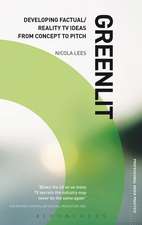Class Divisions in Serial Television
Editat de Sieglinde Lemke, Wibke Schniedermannen Limba Engleză Hardback – 5 ian 2017
Preț: 526.35 lei
Preț vechi: 619.24 lei
-15% Nou
Puncte Express: 790
Preț estimativ în valută:
100.73€ • 104.57$ • 83.99£
100.73€ • 104.57$ • 83.99£
Carte tipărită la comandă
Livrare economică 22 martie-05 aprilie
Preluare comenzi: 021 569.72.76
Specificații
ISBN-13: 9781137594488
ISBN-10: 1137594489
Pagini: 228
Ilustrații: VII, 213 p. 6 illus. in color.
Dimensiuni: 148 x 210 x 18 mm
Greutate: 0.39 kg
Ediția:1st ed. 2016
Editura: Palgrave Macmillan UK
Colecția Palgrave Macmillan
Locul publicării:London, United Kingdom
ISBN-10: 1137594489
Pagini: 228
Ilustrații: VII, 213 p. 6 illus. in color.
Dimensiuni: 148 x 210 x 18 mm
Greutate: 0.39 kg
Ediția:1st ed. 2016
Editura: Palgrave Macmillan UK
Colecția Palgrave Macmillan
Locul publicării:London, United Kingdom
Cuprins
Introduction: Class Di_visions and the Cultural Politics of Serial Television.Sieglinde Lemke and Wibke Schniedermann.- Part I.(Di)Vision: “Lower” Class Televisibility.- 1.Framing Class, Vicarious Living, and Conspicuous Consumption.Diana Kendall.- 2.American Media's Class Distinctions: “Hillbillies,” “Welfare Queens,” and “Teen Moms”.Diana Owen.- 3.The Paradoxical Class Politics in Here Comes Honey Boo Boo.Evangelia Kindinger.- 4.Reality TV and Its Audiences Reconsidered: Class and Poverty in Undercover Boss.Tanja Aho. Part II.Di*Visions: Screening Exploitation, Neoliberal Lies, and the Politics of Class Realignment.- 5.Lifestyle Precarity and Creative Class Affirmation in Girls.Eric C. Erbacher.- 6.House of Lies and the Management of Emotions.Stefanie Mueller.- 7.The Financialization of Domestic Space in Arrested Development and Breaking Bad.Julia Leyda.- 8.Realignment and Televisual Intellect: The Telepraxis of Class Alliances in Contemporary Subscription Television Drama.Stephen Shapiro
Notă biografică
Sieglinde Lemke is the author of Poverty, Inequality, and Precarity in Contemporary American Culture (Palgrave Macmillan 2016), Vernacular Matters in American Literature (Palgrave Macmillan 2009) and Primitivist Modernism: Black Culture and the Origins of Transatlantic Modernism (1998). She studied at the University of Konstanz and at UC Berkeley, was a guest professor at Harvard and taught at the John F. Kennedy Institute at the Free University in Berlin. As a Senior Professor in the English Department at the Albert-Ludwigs University Freiburg, Germany, Lemke teaches American Cultural and Media Studies and is also the director of the Black Forest Writing Seminars.
Wibke Schniedermann is a postdoctoral researcher at the International Graduate Centre for the Study of Culture at Giessen University, Germany where she is currently working on a book about representations of homelessness in American culture. Schniedermannreceived her PhD in American Studies from Frankfurt University and was part of a research project funded by the German Research Foundation at Freiburg University. She has taught American literary and cultural studies at Frankfurt University and Mannheim University.
Textul de pe ultima copertă
This book brings the emergent interest in social class and inequality to the field of television studies. It reveals how the new visibility of class matters in serial television functions aesthetically and examines the cultural class politics articulated in these programmes. This ground-breaking volume argues that reality and quality TV’s intricate politics of class entices viewers not only to grapple with previously invisible socio-economic realities but also to reconsider their class alignment. The stereotypical ways of framing class are now supplemented by those dedicated to exposing the economic and socio-psychological burdens of the (lower) middle class. The case studies in this book demonstrate how sophisticated narrative techniques coincide with equally complex ways of exposing class divisions in contemporary American life and how the examined shows disrupt the hegemonic order of class. The volume therefore also invites a rethinking of conventional models of social stratification.
Caracteristici
Analyzes both fictional and “reality” TV series Focuses on social class, representation and televisual semantics of class divisions Foregrounds the politics of television aesthetics and production







